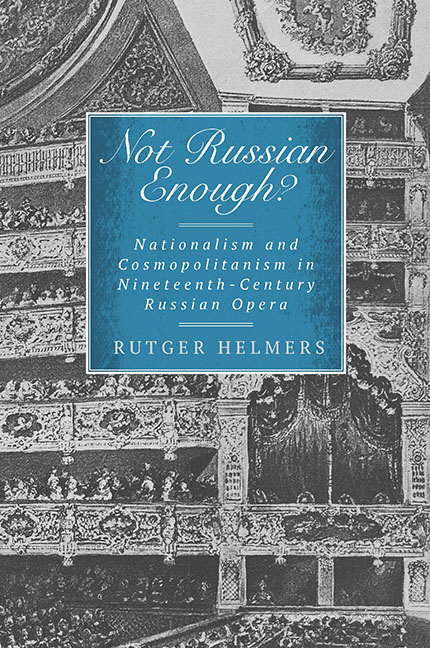Book contents
- Frontmatter
- Dedication
- Contents
- List of Illustrations
- Acknowledgments
- Editorial Notes
- Introduction: The Part and the Whole
- A Life for the Tsar and Bel Canto Opera
- Subject Matter, Local Color, and National Style in Judith
- French Theatricality and Inadvertent Russianisms in The Maid of Orléans
- The Tsar's Bride and the Dilemma of History
- Conclusion
- Abbreviations
- Notes
- Bibliography
- Index
Subject Matter, Local Color, and National Style in Judith
Published online by Cambridge University Press: 15 March 2018
- Frontmatter
- Dedication
- Contents
- List of Illustrations
- Acknowledgments
- Editorial Notes
- Introduction: The Part and the Whole
- A Life for the Tsar and Bel Canto Opera
- Subject Matter, Local Color, and National Style in Judith
- French Theatricality and Inadvertent Russianisms in The Maid of Orléans
- The Tsar's Bride and the Dilemma of History
- Conclusion
- Abbreviations
- Notes
- Bibliography
- Index
Summary
Aleksandr Serov's first opera, Judith, sits uneasily in the standard narrative of Russian music. From the moment of its premiere in 1863, Serov's friends and foes alike agreed that this work was the most significant composition for the stage since Glinka's two operas and Dargomïzhsky's Rusalka (1856). In time it would be canonized simply as “the fourth important Russian opera.” Serov had made his mark in musical circles as a progressive critic and relentless polemicist, and as music historian Nikolay Findeyzen observed, he was—after Anton Rubinstein, the director of the Russian Musical Society and the Saint Petersburg Conservatory—“without doubt the most remarkable, interesting and characteristic musical figure of Saint Petersburg in the sixties.” After the doors of the Conservatory opened in 1862, in fact, curious students soon flocked to the independent-minded critic-composer. The future critic Herman Laroche and Pyotr Tchaikovsky eagerly attended the rehearsals of Judith, and both were sufficiently impressed by Judith to keep a high opinion of the opera throughout their lives.
Apart from Judith, Serov's reputation as a composer rests almost exclusively on his two other operas, Rogneda (1865) and The Power of the Fiend (1871). Insignificant as each of these works may seem in the twenty-first-century musical world and the history of music at large, their impact on contemporary cultural life in Russia was considerable. Judith and Rogneda were among the most successful Russian works of the mid-nineteenth century: the latter was an unparallelled success at the box-office, while the former proved to be Serov's most substantial claim to the esteem of contemporary critics and fellow musicians. In an obituary published shortly after Serov's death in 1871, Laroche argued that Judith was among the very few Russian operas that were not only worthy of praise within the national context, but would in fact “be a pride to the musical literature of any of the Western nations.”
It is within the national context, however, that Judith stands out. Based on the familiar apocryphal biblical story, Judith belongs to the minority of nineteenth-century Russian operas that do not have a Russian or Ukrainian (i.e., “Little-Russian”) subject.
- Type
- Chapter
- Information
- Not Russian Enough?Nationalism and Cosmopolitanism in Nineteenth-Century Russian Opera, pp. 50 - 81Publisher: Boydell & BrewerPrint publication year: 2014

